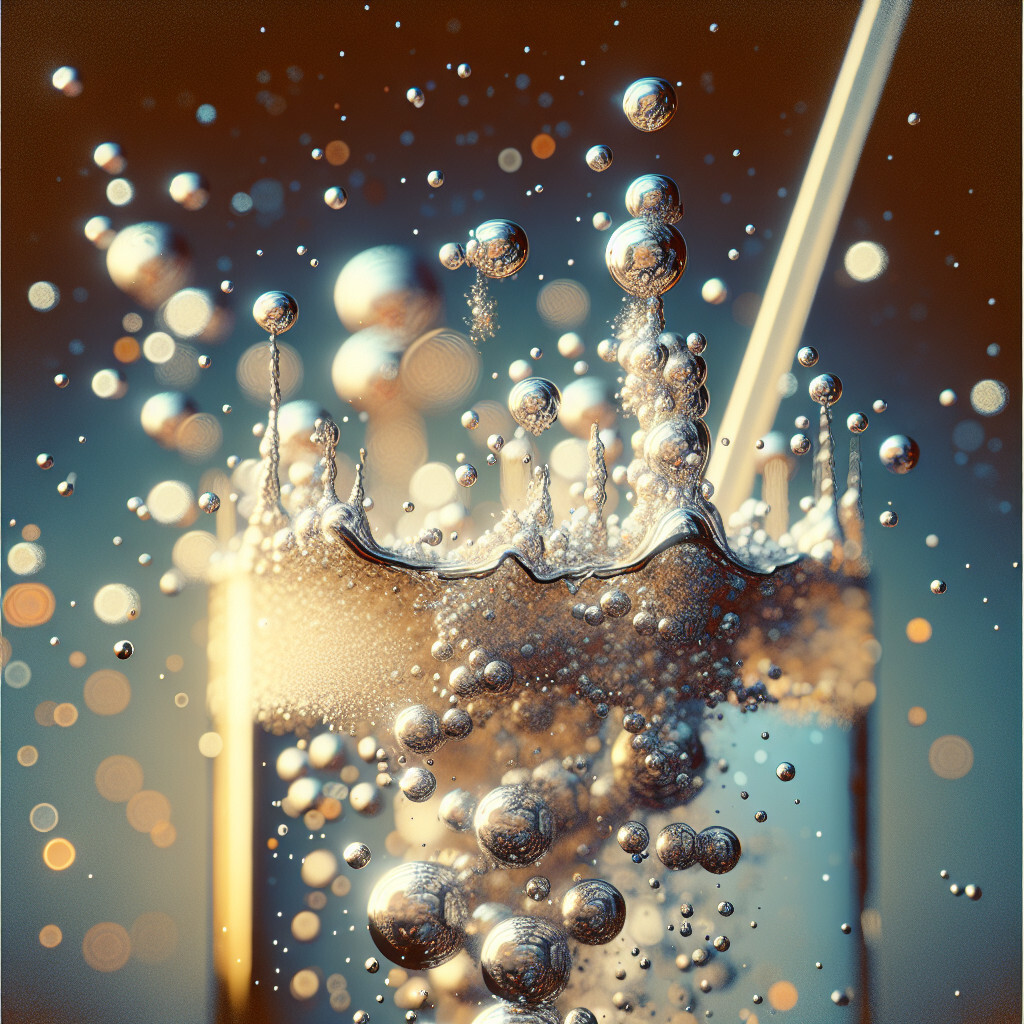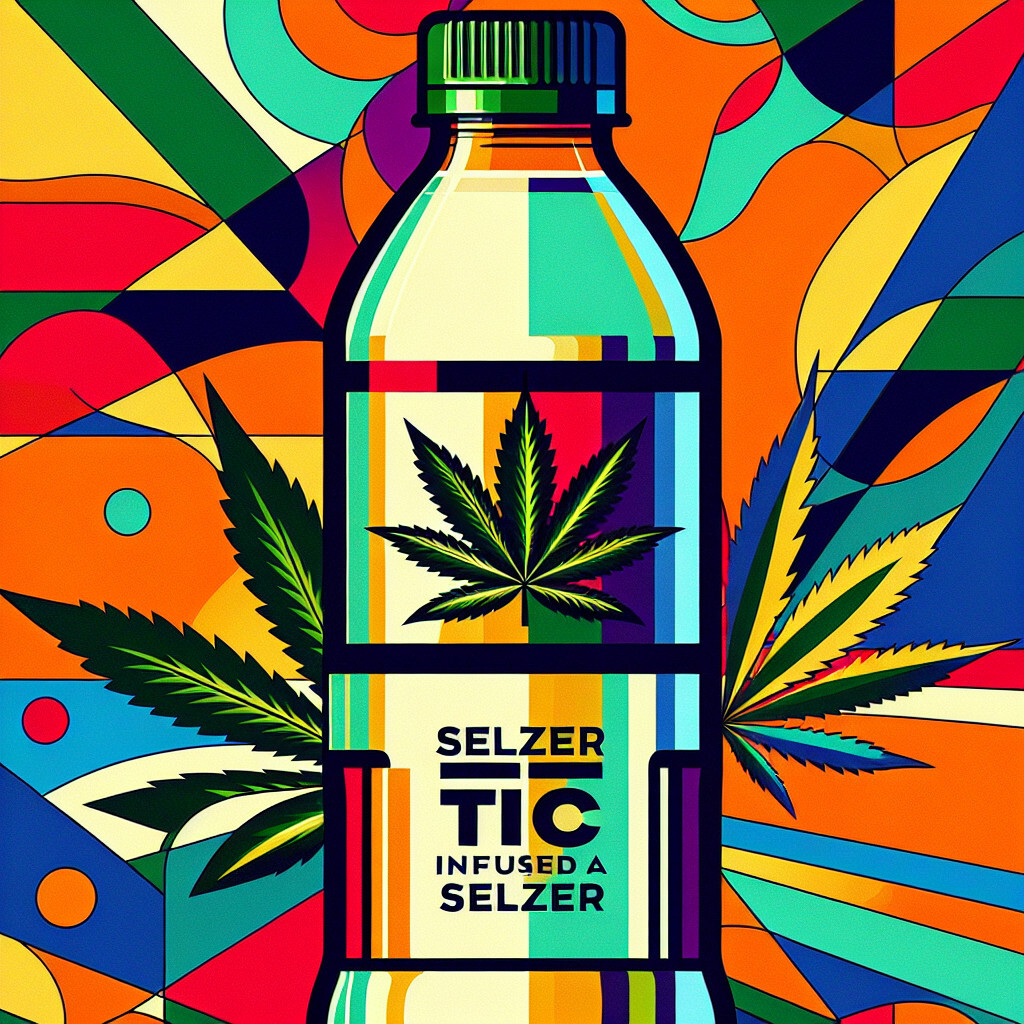-
Table of Contents
- Introduction
- Understanding the Health Benefits of Natural Seltzer Water Ingredients
- Exploring the Role of Minerals in Natural Seltzer Water
- The Science Behind Carbonation: Key Ingredient in Natural Seltzer Water
- Natural Flavors in Seltzer Water: What You Need to Know
- The Impact of Natural Seltzer Water Ingredients on Hydration and Health
- Q&A
- Conclusion
“Pure Simplicity: Nothing but Water and Natural Essence.”
Introduction
Natural seltzer water, also known as sparkling water, is a popular beverage characterized by its effervescence and refreshing taste. The primary ingredients in natural seltzer water are water and naturally occurring gases, typically carbon dioxide. This carbonation process can occur naturally in certain spring waters that are rich in minerals, or it can be artificially induced. Some brands may also add natural flavors or minerals to enhance the taste. Despite its simplicity, the quality and source of these ingredients can significantly impact the taste and nutritional value of the final product.
Understanding the Health Benefits of Natural Seltzer Water Ingredients

Natural seltzer water, also known as sparkling water, has gained significant popularity in recent years. Its refreshing taste, combined with its health benefits, makes it an excellent alternative to sugary sodas and other carbonated beverages. But what exactly are the ingredients in natural seltzer water, and how do they contribute to our health? Let’s delve into the details.
Natural seltzer water is essentially water that has been carbonated, meaning it has been infused with carbon dioxide under pressure. This process gives the water its characteristic fizz and tangy taste. The primary ingredient in natural seltzer water is, of course, water. Water is vital for our bodies, playing a crucial role in maintaining our overall health. It aids in digestion, helps regulate body temperature, lubricates joints, and is essential for the proper functioning of all our body’s cells, tissues, and organs.
The second key ingredient in natural seltzer water is carbon dioxide. While carbon dioxide is often associated with harmful emissions, in small quantities, it is harmless when consumed. The carbonation process does not alter the water’s health benefits but instead adds a pleasing effervescence that many people enjoy.
Some brands of natural seltzer water also contain added minerals such as calcium, potassium, and magnesium. These minerals are not only beneficial for our health but also contribute to the taste of the water. Calcium is essential for bone health, potassium helps regulate blood pressure, and magnesium plays a role in over 300 enzymatic reactions in the body, including energy production and DNA synthesis.
Natural seltzer water may also contain natural flavors derived from fruits, herbs, or spices. These flavors do not add any nutritional value but can make the water more enjoyable to drink. It’s important to note that “natural flavors” should be derived from natural sources and not contain any artificial additives. However, the definition of “natural flavors” can vary between brands, so it’s always a good idea to check the product label if you have any concerns.
Now, let’s turn our attention to the health benefits of these ingredients. The hydration provided by the water in natural seltzer water is, of course, essential for our health. Staying hydrated helps maintain the balance of bodily fluids, aids in digestion, helps keep our skin looking good, and can even help control calorie intake.
The minerals found in some brands of natural seltzer water can also provide health benefits. For example, adequate intake of calcium can help prevent osteoporosis, while potassium can help lower blood pressure. Magnesium is essential for many processes in the body, including regulating muscle and nerve function, blood sugar levels, and blood pressure.
In conclusion, natural seltzer water is a healthy and refreshing beverage choice. Its primary ingredients, water and carbon dioxide, provide hydration and a pleasing fizz, respectively. Additional minerals and natural flavors can enhance both the health benefits and the taste of the water. However, as with any food or beverage, it’s important to consume natural seltzer water in moderation as part of a balanced diet. So, the next time you’re thirsty, why not reach for a glass of natural seltzer water? It’s a choice your body will thank you for.
Exploring the Role of Minerals in Natural Seltzer Water
Natural seltzer water, also known as sparkling water, has gained significant popularity in recent years. Its refreshing taste and effervescence make it a delightful alternative to still water and sugary soft drinks. But what exactly is in natural seltzer water that makes it so appealing? The answer lies in its unique composition of minerals and carbonation.
Natural seltzer water is essentially water that has been carbonated, meaning it has been infused with carbon dioxide under pressure. This process gives the water its characteristic fizz. However, unlike many commercial soft drinks, natural seltzer water does not contain added sugars, artificial flavors, or preservatives. Instead, it often contains a variety of naturally occurring minerals that contribute to its taste and potential health benefits.
One of the primary minerals found in natural seltzer water is calcium. This mineral is essential for bone health, nerve function, and muscle contraction. Some brands of natural seltzer water can provide a significant amount of your daily calcium needs, making it a beneficial addition to your diet.
Magnesium is another mineral commonly found in natural seltzer water. This mineral plays a crucial role in over 300 enzymatic reactions in the body, including those involved in energy production, DNA synthesis, and protein formation. Moreover, magnesium contributes to the water’s slightly bitter taste, which can be a pleasant contrast to the sweetness of many other beverages.
Potassium, a mineral that helps regulate fluid balance, nerve signals, and muscle contractions, is also often present in natural seltzer water. Consuming beverages rich in potassium can help offset the effects of a diet high in sodium, which is common in many Western diets.
In addition to these minerals, natural seltzer water may also contain trace amounts of other minerals like zinc, copper, and manganese. These minerals are essential for various bodily functions, including immune function, wound healing, and metabolism regulation.
The mineral content of natural seltzer water can vary significantly depending on its source. Some brands use mineral-rich spring or well water, while others add minerals to purified water to enhance its taste and nutritional profile. Therefore, it’s always a good idea to check the label to understand what you’re getting.
It’s worth noting that while the minerals in natural seltzer water can contribute to your daily nutrient intake, they’re not a substitute for a balanced diet. Consuming a variety of nutrient-dense foods is the best way to ensure you’re getting all the minerals your body needs.
Moreover, while natural seltzer water is a healthier choice than sugary soft drinks, its carbonation can make it more filling than still water. This can be beneficial for those trying to control their calorie intake, but it may also lead to reduced overall fluid intake. Therefore, it’s important to also drink plenty of non-carbonated fluids to stay properly hydrated.
In conclusion, the minerals in natural seltzer water not only contribute to its unique taste but also offer potential health benefits. Whether you enjoy it as a refreshing beverage on a hot day, a mixer in your favorite cocktail, or a palate cleanser during a meal, natural seltzer water is a versatile and healthful addition to your beverage repertoire.
The Science Behind Carbonation: Key Ingredient in Natural Seltzer Water
Natural seltzer water, a popular beverage choice for many, is known for its refreshing taste and effervescence. But what exactly gives seltzer water its distinctive fizz? The answer lies in the science behind carbonation, the key ingredient in natural seltzer water.
Carbonation is a process that involves dissolving carbon dioxide (CO2) gas in water (H2O). This process occurs under pressure, and when the pressure is released, such as when you open a bottle of seltzer water, the carbon dioxide is released in the form of bubbles, creating the characteristic fizz.
The process of carbonation can occur naturally in certain spring waters that are naturally high in minerals. These waters absorb carbon dioxide from the surrounding rock and soil, becoming naturally carbonated. This is how the first naturally carbonated waters, or seltzers, were discovered. However, most of the seltzer water we drink today is artificially carbonated. This involves injecting pressurized carbon dioxide into water, a process that was first developed in the 18th century.
The carbonation process not only gives seltzer water its fizz but also creates carbonic acid, which gives the water a slightly tart taste. This is why seltzer water has a different taste compared to regular water, even when no additional flavors are added.
In addition to carbon dioxide and water, natural seltzer water may also contain various minerals, depending on the source of the water. These can include calcium, magnesium, and potassium, among others. These minerals can contribute to the taste of the water and may also offer some health benefits. For example, calcium is important for bone health, while magnesium plays a role in many biochemical reactions in the body.
However, it’s important to note that while natural seltzer water can be a source of these minerals, the amounts are usually quite small. Therefore, while seltzer water can be a healthy and refreshing beverage choice, it should not be relied upon as a primary source of these essential nutrients.
Another point to consider is that not all seltzer waters are created equal. Some brands may add additional ingredients, such as sweeteners or artificial flavors. While these can make the water taste more appealing, they can also add unnecessary calories and chemicals. Therefore, when choosing a seltzer water, it’s always a good idea to check the label and choose a brand that uses natural ingredients.
In conclusion, the key ingredient in natural seltzer water is carbon dioxide, which is responsible for the water’s distinctive fizz and slightly tart taste. The process of carbonation can occur naturally or be artificially induced, and the water may also contain various minerals, depending on its source. However, it’s important to remember that while seltzer water can be a healthy beverage choice, it should not be relied upon as a primary source of essential nutrients. And as always, it’s important to choose a brand that uses natural ingredients.
Natural Flavors in Seltzer Water: What You Need to Know
Natural seltzer water has gained significant popularity in recent years, with many people turning to it as a healthier alternative to sugary sodas and artificially flavored drinks. But what exactly are the ingredients in natural seltzer water, and what should you know about them?
Seltzer water, also known as sparkling water, is essentially water that has been carbonated. This carbonation process involves the addition of pressurized carbon dioxide gas, which gives the water its characteristic fizz. The primary ingredient in seltzer water is, therefore, water, followed by carbon dioxide. However, many brands of seltzer water also include natural flavors to enhance the taste.
The term “natural flavors” can be somewhat ambiguous, but according to the U.S. Food and Drug Administration (FDA), a natural flavor is one that’s derived from a plant or animal source. This could include a wide range of substances, from fruit extracts to essential oils, spices, and more. The specific natural flavors used in seltzer water can vary greatly depending on the brand and the intended flavor of the product. For example, a lemon-flavored seltzer water might contain natural lemon extract, while a berry-flavored seltzer might include natural berry flavors.
While the use of natural flavors can make seltzer water more appealing to the palate, it’s important to note that these flavors don’t typically add any nutritional value to the drink. They’re used primarily for taste, not for health benefits. That being said, natural flavors are generally considered safe for consumption. The FDA requires that they be safe to eat and that they’re derived from natural sources, as opposed to artificial flavors, which are synthesized from chemical compounds.
However, some people may have sensitivities or allergies to certain natural flavors, so it’s always a good idea to check the label if you have any known food allergies or sensitivities. Additionally, while natural flavors are derived from natural sources, they’re often highly processed and may bear little resemblance to the original source material. For example, a natural raspberry flavor might not contain any actual raspberries, but rather a combination of natural substances that mimic the taste of raspberries.
In conclusion, the ingredients in natural seltzer water are quite straightforward: water, carbon dioxide, and natural flavors. The natural flavors used can vary widely and are used primarily to enhance the taste of the water, not to provide any nutritional benefits. While these flavors are generally safe for consumption, those with food allergies or sensitivities should always check the label.
As with any food or beverage, it’s important to consume seltzer water in moderation as part of a balanced diet. While it’s a healthier alternative to sugary sodas, it’s still not a substitute for plain, still water. So, enjoy your natural seltzer water, but remember to also stay hydrated with regular water for optimal health.
The Impact of Natural Seltzer Water Ingredients on Hydration and Health
Natural seltzer water, also known as sparkling water, has gained significant popularity in recent years. Its refreshing taste, combined with its hydrating properties, makes it a preferred choice for many health-conscious individuals. But what exactly are the ingredients in natural seltzer water, and how do they impact hydration and overall health?
Natural seltzer water is essentially water that has been carbonated, meaning it has been infused with carbon dioxide under pressure. This process gives the water its characteristic fizz and tangy taste. The primary ingredient, therefore, is water, followed by carbon dioxide. Some brands may also add natural flavors or minerals for taste, but pure seltzer water does not contain any sugars, artificial sweeteners, or other additives.
The primary impact of natural seltzer water on hydration is positive. Like still water, it helps replenish the body’s water content, which is crucial for maintaining bodily functions and overall health. The carbonation in seltzer water does not affect its ability to hydrate. In fact, some people may find themselves drinking more water when it’s carbonated, as the fizziness can make the drinking experience more enjoyable.
However, it’s important to note that while seltzer water is hydrating, it should not replace regular water entirely. The carbonation can cause bloating and gas in some individuals, particularly if consumed in large amounts. Additionally, while the acidity of seltzer water is generally low, frequent consumption can potentially contribute to dental erosion over time. Therefore, moderation is key when incorporating seltzer water into your hydration routine.
When it comes to overall health, natural seltzer water can be a beneficial addition to a balanced diet. It is calorie-free and sugar-free, making it a healthier alternative to sugary sodas and juices. For those trying to reduce their sugar intake or manage their weight, switching to seltzer water can be a helpful strategy.
Moreover, the carbonation in seltzer water can also aid in digestion. It can stimulate the nerves responsible for swallowing and satiety, which can help control appetite and prevent overeating. Some studies also suggest that it can help alleviate symptoms of indigestion and constipation.
However, it’s worth noting that not all seltzer waters are created equal. Some brands may add sugars, artificial sweeteners, or other additives to enhance the taste. These additions can negate the health benefits of seltzer water, turning it into just another sugary beverage. Therefore, it’s crucial to read the labels carefully and choose a brand that offers pure, natural seltzer water.
In conclusion, the ingredients in natural seltzer water, primarily water and carbon dioxide, can positively impact hydration and overall health when consumed in moderation. It can serve as a refreshing, calorie-free alternative to sugary beverages, aid in digestion, and contribute to hydration. However, it’s essential to choose a brand that doesn’t add unnecessary sugars or additives, and to balance its consumption with regular water to avoid potential side effects. As with any dietary choice, it’s always best to consult with a healthcare professional to determine what’s best for your individual health needs.
Q&A
1. Question: What is the primary ingredient in natural seltzer water?
Answer: The primary ingredient in natural seltzer water is water.
2. Question: Are there any artificial ingredients in natural seltzer water?
Answer: No, natural seltzer water does not contain any artificial ingredients.
3. Question: What gives natural seltzer water its bubbles?
Answer: Carbon dioxide is added to natural seltzer water to give it its bubbles.
4. Question: Does natural seltzer water contain any sweeteners?
Answer: No, natural seltzer water does not contain any sweeteners.
5. Question: Are there any calories in natural seltzer water?
Answer: No, natural seltzer water does not contain any calories.
Conclusion
Natural seltzer water typically contains only two ingredients: water and naturally occurring carbonation. Some brands may add minerals for taste, but pure seltzer should not contain any added sugars, artificial sweeteners, or other chemicals. Therefore, it can be concluded that natural seltzer water is a simple, clean beverage option.







